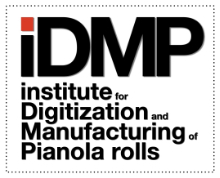The best way to secure your portfolio
The surviving music rolls are mostly ninety to over one hundred and twenty years old. Despite high-quality paper, they are fragile and sometimes even damaged due to ageing and use, and are therefore no longer safe to play. In terms of preservation, professional digitization is the best way to preserve the valuable originals. Very important: you decide how the digital copies we produce from your rolls are used.

Thousands of rolls already digitized
We have years of experience in digitizing music rolls of various types and formats. And this is also necessary in order to handle the sometimes fragile music rolls safely and at the same time produce high-quality digitized copies that are required for the preservation of the collection. Provided that the owner of the rolls agrees, we can use the digital copies to create authentic new stampings on request, which can be used safely for performances in order to protect the fragile originals. We can also create processed image data and audio emulations for your requirements. However, this requires a significant amount of additional work for each individual title. For experts in music and interpretation research, the raw image data in particular are valuable sources, as any further processing already means an intervention in the original data material using numerous assumptions and empirical values.
For the digitization, we work closely with the Bern University of the Arts (HKB, CH), which kindly provides us with the powerful optical scanner (see illustration). This makes it possible to create precise digital copies that capture both the perforated information on the music rolls and the image data with the notations that are sometimes present on the rolls. We also have our own pneumatic scanner in use.

We record metadata for each role
During digitization, we record important details about each roll in a metadata database, including, for example, roll number, title, composer, pianist, tempo, condition of the roll and box, anomalies and notes, weight, length of the punching area, etc.. This provides data that proves to be very valuable for later research work. We can also include further information by comparing it with our catalog information and using other sources.
When looking through all the music rolls, hidden special features are usually also found, such as production rolls, handwritten notes on the production of the respective music roll, etc.. For some types of rolls, the tempo and accentuation information is noted graphically on the rolls, making it important to record them. A complete inspection of the entire roll stock by trained eyes is also important, as even in good storage conditions, pests or damage from previous transports or incorrect handling (e.g. old rubber for fixing the roll) can sometimes become apparent, the negative consequences of which should be rectified as early as possible.

Cooperation with experts and institutions
Our references speak for themselves - and mostly well about us. We work closely with universities, institutions and experts all over the world, and have realized projects with Stanford University, Sydney University, Goethe University Frankfurt am Main, Rheinische Friedrich-Wilhelms-Universität Bonn, and many more. Numerous museums have used our services, such as the Augustiner Museum in Freiburg, the Musical Instrument Museum in Bruchsal, the Musical Museum in Brentford (UK), the Mahler Museum in Hamburg, and many more.
In addition, our music rolls are of course used by numerous institutions, collectors and musicians all over the world. Every day, we work to preserve the worldwide stock of historical music rolls - and to make the wonderful music on them available to as many people as possible. We 'do everything by the book', i.e. we conclude contracts with them in which all aspects of the treatment of the valuable music rolls, insurance cover and the handling of the digital copies are regulated. If you are interested in working with us, please contact us.

Enjoying music and inspiring people
Despite our fascination with technology and the many exciting details surrounding music rolls, we are particularly enthusiastic about music. Our aim is to make this almost unlimited repertoire accessible to as many people as possible. In the spirit of the quote attributed to Gustav Mahler 'Tradition is not the keeping of ashes, but the passing on of the flame' (Thomas More, 1478-1535), we regularly perform at events with lectures, demonstrations or concert introductions.
There are so many exciting historical details about the instruments and music rolls, the recording processes and production methods, the composers and pianists and, of course, the pieces of music - every layman and expert will be thrilled. In February 2024, for example, we were able to delight the Duisburg audience with the piano reduction 'Das himmlische Leben' recorded by Gustav Mahler himself as part of a concert introduction to Mahler's Fourth Symphony.
